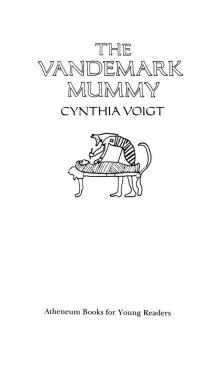- Home
- Cynthia Voigt
By Any Name Page 4
By Any Name Read online
Page 4
“By getting married,” he pointed out.
“Of course.”
“To one of these fiancés.”
“What’s the point of getting engaged if you don’t ever get married?”
He laughed, and she laughed too, and she leaned over to kiss him in that way she had, her palm against his cheek.
“How can I convince you not to get engaged to everyone who asks you?”
“You’d have to marry me,” she said. “Because then it would be illegal. To get engaged to anyone else,” she explained, since she seemed yet again to have confused him.
“Marry you?”
“Since you love me,” she told him, for the hundredth or so time, and this time he realized that she was right. He did love her. He heard himself ask, “Will you? Marry me?”
“Of course. But you have to give me a ring to make it real.”
“No, Rida, I mean marry-marry. Not engaged-marry.”
“I know that.”
“And you have to break it off with those other fiancés.”
“I will. But we can’t get married right away, you know. It takes time, and you have to give me a ring to show you really mean it.”
He knew better. “My captain can marry us. I’m not kidding about this, Rida.”
“I know you aren’t. In the first place, you’re not a kidder. And besides, you’re crazy about me. Of course you want to marry me.”
“I am!” he laughed. “I do!” He hoped the captain, a paternalistic type, would go along with this project. Because suddenly he found himself able to hope.
When he made his request, first thing on Monday, the captain observed, “I’ll say this, Howland, she’s good for your nerves. We sail Tuesday.”
“That’s tomorrow!”
“It’s already been delayed three days. So get the girl right over here, Lieutenant. You’ve got a ring? The girl has to have a ring. You take care of that, I’ll do the paperwork, and you be back here by 1600 hours. She’s eighteen, isn’t she?”
Pops had no idea getting married could be so simple. Mumma, on the other hand, would have been both surprised and displeased had things not gone along quickly and smoothly. Not because she trusted Pops, nor because she trusted the Navy—neither of these being in her opinion particularly efficient entities—but because it was what she wanted. So she and Pops stood up in front of the captain to make their vows. They used a ring from Mumma’s collection, a silver band with a turquoise stone set in it, which she’d been given by an Air Force fiancé who trained in Arizona where there were Navaho silversmiths. They had a wedding dinner at the Officers’ Club with their friends—Katy and Louella, who had been instrumental in their meeting, and Rob and Marty. (“Those men got pretty drunk but you couldn’t expect them to be too happy when it was my wedding dinner to someone else.”) After the dinner, and a final drink at the little bar on the beach, they went to a hotel.
The next morning, Pops left port and Mumma stood on the dock watching until the ship could no longer be seen in the oceanic distances. (“I was a wife now. I had to stay and wave as long as the other wives. So I did. And I didn’t lay eyes on him again for years. Talk about being deprived of a honeymoon. You girls have no idea.”)
2.
A Marriage Is Announced
The telegram arrived on a spring morning in 1943. Grandmother was alone in the Boston house—alone, that is, except for the servants, including the housekeeper, Mrs. Cook, to whom the maid passed the yellow Western Union envelope, holding it out in front of her between two fingers like something particularly nasty, which—it being wartime—a telegram was likely to be. Mrs. Cook put the thing on a small silver tray and carried it in to Grandmother, who sat at her desk in the front parlor, tidying up some corner of her many-cornered, much-tidied life. Always preferring not to show emotions devant les servants, or devant anyone else, for that matter, Grandmother excused the hovering housekeeper before opening the telegram to learn that her second son—Spencer, always something of a disappointment—had gotten married, in Hawaii of all places.
Because lunch in the big house on Louisburg Square was at twelve thirty, precisely, Grandmother had the time to respond immediately to Spencer’s telegram, and she had the stationery, too. Her name appeared engraved at the top of the sheet of thick, cream-colored paper, each black letter slightly raised: DOROTHY SPENCER HOWLAND. Under that name, in equally elevated letters, were printed both the in-town address and the summer address on the Cape. Upon her marriage to Brundage Howland, the Howland mansion on Louisburg Square had become her home, but it was she who brought into his family the property on Cape Cod. More than any of the trusts or inheritances, investments or acquisitions, these two houses exemplified the fiscal self-definition of each of my grandparents. Grandmother took pride in the ever-escalating value of shorefront acres on the Cape, while Grandfather boasted of a family home with the kind of history no amount of money could purchase. For three months every year, the family rusticated out on the Cape; the remainder of the year they spent on Louisburg Square, in the heart of Boston, where, on that spring morning, Grandmother sat at her desk to write to her second son, on her second-best stationery.
From under her engraved aegis, Grandmother let Pops have it.
Honestly, Spencer, I cannot for the life of me imagine what you were thinking of. Your thoughtlessness leaves me speechless. Your selfishness—I can only remind myself you’re still a boy, you don’t understand. But isn’t it time you grew up? Intellectual as you are, you still cannot be so absentminded as to have forgotten about your poor brother. I mean Brundy, of course; Ethan, as you have probably also forgotten, still has another year at Groton, and by then either the powers that be will have recognized that the country has need of an educated class, although I do find this an unlikely prospect, or this particular world crisis may have passed. Because surely, at some point, all of this must be finished. Although since it has already gone on as long as the last time and shows no signs of abatement, Brundy will simply have to languish in his captivity and make the best of it. It has been five months now, but Barth is a seafront city, which will give him some consolation. I realize that you cannot write to him, but I do hope you spare him a thought. Perhaps you will be more considerate of your brother than you were of your mother. I can at least hope for that.
But where was your brain? And you credited with such a high IQ. (Well, I have always been dubious about those IQ tests.) Be that as it may, even you must have known the effect a telegram would have, arriving here, with two sons in the service, and I always alone in the mornings. Suffice it to say, I am disappointed in you. I don’t know how I could have failed to teach you basic consideration for others. When Mrs. Cook carried in that dreadful yellow envelope, I almost had a heart attack on the spot, with only Mrs. Cook and little Louisa in the house should I need help, seeing as although Martina can cook wonderfully she is too excitable to be of any use in an emergency. As soon as I saw the telegram, I knew something terrible had happened.
I trust I have made clear to you just what you have done. I can only hope that understanding it will lead you to mend your ways. In the meantime, I will pass on your news to the rest of the family. They will communicate to you directly, if they wish, although they are all quite busy, Anne with her nursing courses, Juliet at school, and your sister Phyllis expecting her second child, and I tell you frankly, I don’t know about that. This doesn’t seem like a world into which one wants to bring a child, however privileged its position will be.
That is the news from home, Spencer. We are all as well as can be expected. I hope I have made clear to you how very strongly I feel about your tendency to communicate by telegram. If you ever do something like this to me again, I will not be able to forgive you.
With love,
Mother
In Louisburg Square, the entire household assembled for luncheon—its three courses too stately to be a mere lunch although not elaborate enough for dinner. Our tall, handsome, hawk-nosed grandfat
her always left his office at twelve twenty, precisely, to arrive in time to take his place at the head of the table. In those years, Lally, whom Brundy had married in 1938, was living with her in-laws, her life in limbo until her husband’s fate was fulfilled. Also in residence and required to attend the meal were the two younger daughters: Anne, for whom it was often an inconvenience, and Juliet, for whom Grandmother had only to procure the necessary permission from a day school, which presented no difficulty. It was to this gathered assemblage—including Little Louisa, who was serving from the tureen of soup, and through her to Mrs. Cook and Martina, when they had their own lunch later, in the kitchen, and through them to Dennis the chauffeur/groundsman, too old for the draft, and his gardening assistant, too young for it—that Grandmother announced Spencer’s marriage.
I picture Grandmother’s table, set with plain linen mats as befitting the midday meal, and the dimly lit dining room around it, all dark wooden wainscoting and dark silvery chinoiserie paper with scenes of Chinese gentlemen standing beside Chinese rivers or beneath improbably conical Chinese mountains. I picture the slow procession of courses, soup and then whatever light hot dish Mrs. Cook had arranged and Martina had prepared, to give Grandfather the strength to get through his important afternoon. For dessert, at lunchtime, there would be only a plate of cookies or bars and a selection of fruit. I see Grandfather as he appears in photographs, a distinguished figure in the charcoal-gray three-piece suit he always wore, and I picture Grandmother at the opposite end of the long table in a cashmere sweater set, her pearl necklaces draped over her narrow bosom. Little Louisa, who was no longer at all little when I knew her, ladles tomato bisque into bowls, and when everyone has been served, Grandmother lifts her spoon and says, before Little Louisa is out of earshot, “Your brother has gotten himself married.” The scene became one of Aunt Anne’s favorite family stories, to which all of us children were an eager audience; it is lodged in my memory, narrated in my aunt’s laughter-drenched voice.
At Grandmother’s news, everyone, except for Grandfather, sputtered satisfyingly. She waited for them to swallow, and to respond.
“But Brundy’s already married,” Juliet said, glancing at the young woman seated next to her, reminding them, “to Lally.”
“Isn’t Ethan too young?” Anne asked. “Don’t boys have to be twenty-one? Girls it’s only eighteen, I know, without parental consent, but Ethan’s barely seventeen.”
“I speak of Spencer.”
Grandfather reminded her, “The boy’s engaged.”
“I think we may safely assume that the engagement is off,” Grandmother said. “And I imagine also that it will be up to me to inform Abigail. Spencer would never have the courage, even if he had the wits to think of it. At least,” she consoled herself, “I can count on Abigail to behave well.”
“The boy’s a fool,” Grandfather said.
Anne always enjoyed shocking her father, who took pride in never being shocked, so she said it out loud: “Maybe she’s pregnant.”
“Anne,” her mother breathed correctively.
Grandfather told her, “Abigail is in Boston while your brother is in Hawaii. Surely those nursing courses you insist on taking have taught you enough basic biology to realize that under those conditions pregnancy is an impossibility.”
“I didn’t mean Abigail. I meant—maybe he had to marry her. This other girl, maybe it’s a shotgun wedding.”
“What’s a shotgun wedding?” Juliet asked.
“For God’s sake,” Grandfather expostulated.
“Nothing you need to know about,” Grandmother responded. Juliet, who in fact already knew, grinned at Anne.
“Moreover, given the number of things you young people know at much too early an age, I suspect that the question was ingenuous,” Grandmother said, surprising them. “Don’t you try to play me for a fool, young lady.”
But Anne had just realized the most serious consequence of Spencer’s act. “Now we won’t have Abigail in the family. How could Spencer do that to us? Not to mention that of all the girls we know, she’s the only one who’s perfect for him, not to mention that she’s the only girl he’s ever met who knows as much as he does, not to mention she’s the only one I’ve ever seen who likes talking to him. What’s the matter with Spencer?”
“Who is the bride?” Lally asked. “Have I met her?”
They were too surprised by her asking a question to answer immediately. Lally was grieving for Brundy as if he had died, whereas in fact he had only been taken prisoner and as far as the family knew was still alive. But Lally not only dressed entirely in black, she also went veiled when she left the house. This she did only to take twice-daily walks, always the same route, down across the Commons, across the Gardens, then back up to Louisburg Square. The family sympathized with the poor girl and felt she should be allowed to carry on as she saw fit, but it did make her a detriment at the table. She’d been a sunny child when Brundy married her, a pretty girl from a good family, with a sweet, cheerful disposition. The prolonged absence of her husband and his undecided fate transformed her into what Grandmother called—only when Lally was out of the room, however—a wet blanket. They felt sorry for her, of course, but it was wartime and they wished she would snap out of it. So when Lally showed curiosity about this wife of Spencer’s, everyone turned to Grandmother for the answer. “What’s her name?” Lally asked.
“I have no idea,” Grandmother said. “Smith, nobody we know. Rida, he said her name was, I think. He must have found her in Hawaii. Perhaps she’s a nurse?”
“What if she’s a native girl, an islander?” Anne suggested. “Or Oriental, I mean Chinese. Or mixed, native and Oriental?”
Grandmother dismissed the possibility. “Where would Spencer meet a native girl? Rida with a d, of all the odd things.”
“Or there are a lot of Europeans living in Hawaii,” Anne added. “Artists go to the South Seas, like Gauguin did, Mother. Is she an artist? Or maybe she’s a refugee, from somewhere in Europe. Do you think—Could she be Jewish?”
“Anne,” Grandmother admonished again while Grandfather repeated, “For God’s sake.”
“Probably not, with a name like Smith,” Anne decided.
“Even Spencer would know better,” Grandfather decided.
“In any case, he should never have sent a telegram,” Grandmother maintained. “And he should never have left the job of telling Abigail to me.”
“She’ll be new blood,” Juliet said. “The family could use some new blood. Not that you aren’t, Lally, but you aren’t, you know, new, are you?”
“Should he be lost in action the whole issue will prove moot,” Grandfather said. “Unless there is a child. I must say, I’m sorry now that I instructed the will I did for him. But in my own defense, I did think—we all thought—that when he married it would be to Abigail. That girl would have been the making of him. She’d have done the right thing with Spencer’s estate should he die, and now—Now, anything could happen.”
“Exactly,” Grandmother said. “That’s exactly what I’ve been saying.”
“You know how Spencer is,” Anne reminded them. “He never listens to anyone.”
When Little Louisa came to remove the soup plates and set down the platter of chicken salad for Grandfather to serve onto the pile of Limoges plates she also set in front of him, they spoke of the weather and the war until she had returned to the kitchen.
Then: “I cannot imagine,” Grandmother admitted with unwitting correctness, “what kind of a girl Spencer would pick out, on his own.”
“She’ll have married him for his money,” Grandfather predicted retroactively. “Not his brains.”
“Nobody ever married anyone for his brains. Or for hers, either,” Grandmother announced, not the last time her preconceptions would mislead her about Mumma. “I dread meeting her.”
“Maybe we’ll like her,” Juliet said. “I wonder what made Spencer fall in love with her?”
“I don’t think you
have much to worry about,” Anne decided. “Spencer’s such a stick-in-the-mud, he won’t have done anything too shocking. I think I’ll write and congratulate him.”
“I have already written to him,” Grandmother said. “And put it into the mail. He won’t be sending any more telegrams,” she announced with satisfaction.
• • •
In this, Grandmother was absolutely correct. In fact, it was one of her lifelong complaints about Pops that he did what he was told, especially in regard to what Mumma told him to do, just as it became her lifelong complaint about Mumma that she was simply perverse. According to Grandmother, “You tell her one thing and she will do the opposite, your mother. You can count on her—which I suppose is something.” Grandmother was not as right about things as she thought, but in the matter of the telegram, she predicted Pops accurately. When he was radioed the news, in August 1946, that his wife had given birth to a baby girl in the naval hospital at San Diego, he immediately passed the good news on to his mother, but not by telegram. He wrote a letter that same day which, while brief, was saturated with his happiness. He assured Grandmother of the child and mother’s well-being, revealed the details of weight and length and name, and then signed off, to spread the good news among his shipmates and to telegraph Mumma.

 The Runner
The Runner By Any Name
By Any Name Bad Girls, Bad Girls, Whatcha Gonna Do?
Bad Girls, Bad Girls, Whatcha Gonna Do? Mister Max: The Book of Lost Things: Mister Max 1
Mister Max: The Book of Lost Things: Mister Max 1 The Wings of a Falcon
The Wings of a Falcon Bad Girls in Love
Bad Girls in Love Toaff's Way
Toaff's Way Building Blocks
Building Blocks Orfe
Orfe Tell Me if the Lovers Are Losers
Tell Me if the Lovers Are Losers It's Not Easy Being Bad
It's Not Easy Being Bad The Book of Kings
The Book of Kings Dicey's Song
Dicey's Song A Solitary Blue
A Solitary Blue Tree by Leaf
Tree by Leaf Sons From Afar
Sons From Afar Teddy & Co.
Teddy & Co. Jackaroo
Jackaroo Elske
Elske Izzy, Willy-Nilly
Izzy, Willy-Nilly Come a Stranger
Come a Stranger Mister Max: The Book of Secrets: Mister Max 2
Mister Max: The Book of Secrets: Mister Max 2 Seventeen Against the Dealer
Seventeen Against the Dealer The Callender Papers
The Callender Papers The Vandemark Mummy
The Vandemark Mummy Tale of Birle
Tale of Birle Glass Mountain
Glass Mountain The Tale of Oriel
The Tale of Oriel The Book of Lost Things
The Book of Lost Things The Book of Secrets
The Book of Secrets Tale of Gwyn
Tale of Gwyn